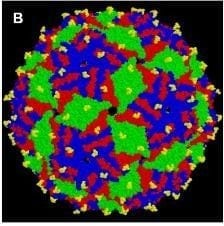
In tests using animals, drug successfully seeks and disarms toxic clumps of proteins responsible for Alzheimer’s and Parkinson’s
An international team of more than 18 research groups has demonstrated that the compounds they developed can safely prevent harmful protein aggregation in preliminary tests using animals. The findings raise hope that a new class of drugs may be on the horizon for the more than 30 diseases and conditions that involve protein aggregation, including diabetes, cancer, spinal cord injury, Alzheimer’s disease, Parkinson’s disease and amyotrophic lateral sclerosis (ALS).
Proteins are necessary for almost every cellular process. However, when cell machinery doesn’t clear out old proteins, they can clump, or aggregate, into toxic plaques that lead to disease.
“Diseases caused by protein aggregation affect millions of people around the world,” said Gal Bitan, Ph.D., associate professor of neurology at the David Geffen School of Medicine at the University of California – Los Angeles, who will present the team’s latest work at the American Society for Biochemistry and Molecular Biology (ASBMB) Annual Meeting during Experimental Biology 2015. “We hope that the new compounds will provide therapy for diseases caused by protein aggregation, many of which have no treatment at all.”
The researchers call the compounds that they developed molecular tweezers because of the way they wrap around the lysine amino acid chains that make up most proteins. The compounds are unique in their ability to attack only aggregated proteins, leaving healthy proteins alone.
To develop a new drug, researchers typically screen large libraries of compounds to find ones that affect a protein involved in a disease. Bitan’s team used a fundamentally different approach to develop the molecular tweezers.
“We looked at the molecular and atomic interactions of proteins to understand what leads to their abnormal clumping,” Bitan said. “Then, we developed a tailored solution. So unlike many other drugs, we understand how and why our drug works.”
The team is in the process of testing multiple versions of the tweezers, each with a slightly different molecular makeup. For CLR01, one of the most promising versions, the researchers have demonstrated therapeutic benefits in two rodent models of Alzheimer’s disease, two fish and one mouse model of Parkinson’s disease, a fish model of spinal cord injury and a mouse model of familial amyloidotic polyneuropathy, a rare disease in which protein aggregation affects the nervous system, heart and kidneys.
“Our data suggest that CLR01, or a derivative thereof, may become a drug for a number of diseases that involve protein aggregation,” Bitan said. “We also found a high safety window for CLR01.”
In one of the safety tests, mice receiving a daily CLR01 dose 250 times higher than the therapeutic dose for one month showed no behavioral or physiological signs of distress or damage. In fact, blood cholesterol in the mice dropped by 40 percent, a possible positive side effect of CLR01.
Read more: New Compounds Could Offer Therapy for Multitude of Diseases
The Latest on: Molecular tweezers
[google_news title=”” keyword=”Molecular tweezers” num_posts=”10″ blurb_length=”0″ show_thumb=”left”]
via Google News
The Latest on: Molecular tweezers
- MOLN Molecular Partners AGon April 26, 2024 at 4:02 am
Molecular Partners AG, a clinical-stage biotechnology company, develops designed ankyrin repeat proteins therapeutics for the treatment of oncology and virology diseases in Switzerland. The ...
- Cambridge Molecular Scienceon April 22, 2024 at 4:59 pm
Its subject matter, atoms and the bonds between them, is now central to many of the life sciences on the one hand, as biological chemistry brings the subject to the atomic level, and to condensed ...
- Diamond-based quantum sensing microscope offers effective approach for quantifying cellular forceson April 22, 2024 at 5:56 am
Cells rely on constant interplay and information exchange with their micro-environment to ensure their survival and perform biological functions. Hence, precise quantification of tiny cellular ...
- Molecular Psychiatryon April 21, 2024 at 5:00 pm
Molecular Psychiatry is a scientific journal published by Nature Publishing Group. It publishes papers in biological psychiatry and, e.g., about psychiatric genetics. With an impact factor of 15. ...
- Hepatitis A Virus: Serology and Molecular Diagnosticson April 19, 2024 at 4:59 pm
Molecular diagnosis of HAV along with anti-HAV IgG avidity measurement are helpful in case of positive IgM where laboratory evidence of acute hepatitis is absent and there is no epidemiologic link ...
- Unraveling the Molecular Mechanisms of DNA Entanglement Resolutionon April 12, 2024 at 11:16 am
Understanding the molecular interactions between the supercoils ... of the DNA wrapped in the loop around gyrase using magnetic tweezers, a biophysical technique that allows to measure the ...
- MTEM Molecular Templates, Inc.on April 10, 2024 at 1:18 am
Molecular Templates, Inc., a clinical stage biopharmaceutical company, focuses on the discovery and development of biologic therapeutics for the treatment of cancer and other serious diseases in ...
- Molecular imaging technique could improve breast cancer screeningon March 27, 2024 at 5:01 pm
Low-dose positron emission mammography (PEM) is a novel molecular breast imaging technique that could potentially replace or supplement mammography. With this in mind, researchers in Canada have ...
- Journal of the American Society for Mass Spectrometryon November 21, 2023 at 4:00 pm
Characterization of Molecular Tweezer Binding on α-Synuclein with Native Top-Down Mass Spectrometry and Ion Mobility-Mass Spectrometry Reveals a Mechanism for Aggregation Inhibition. An In Silico ...
- Medical & Molecular Scienceson September 5, 2023 at 2:11 pm
Medical & Molecular Sciences is committed to providing skilled, critically-thinking practitioners equipped to be future leaders in health sciences. In this pursuit, the Department is committed to ...
via Bing News










